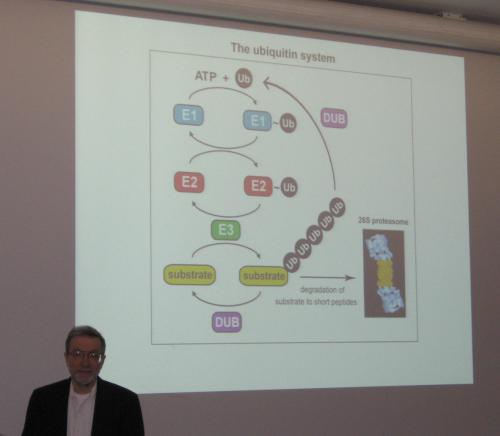
Alex Varshavsky delivers 5th SCILLS Lecture
Alex Varshavsky from the California Institute of Technology, USA delivered the 5th SCILLS Lecture today May 1 2013. He presented work on recent discoveries about the ubiquitin system and the N-end rule pathway.
The 'SCILLS Lecture' is one of our Named Lecture series and serves to celebrate the establishment in 2008 of a major ubiquitylation research Unit within the College of Life at the University of Dundee.
Alexander Varshavsky has made an important contribution to defining the biological importance of the field of ubiquitylation. His laboratory working in this field since the 1980s has made a major contribution to establishing that ubiquitin-dependent processes plays a strikingly broad and unsuspected role in controlling cellular physiology, primarily by regulating the in vivo levels of specific proteins. Research from the Varshavsky laboratory has shown that ubiquitin conjugation is required for the protein degradation in vivo, for cell viability, and also, for the cell cycle, DNA repair, protein synthesis, transcriptional regulation, and stress responses.
Varshavsky also cloned and analysed many of the first ubiquitin genes, namely the first specific E3 ubiquitin ligase (UBR1), the first deubiquitylating enzymes (UBP1 and UBP2). He also identified the first physiological substrate of the ubiquitin system, the MATalpha2 transcriptional repressor. He showed that ubiquitin-dependent proteolysis involves a polyubiquitin chain of unique Lys-48 linked topology is required for protein degradation.
Varshavsky is also well known for his discovery of the 'N-end rule' that shows that the N-terminal amino acid of a protein plays an important role in determining its half-life. He has undertaken critical research delineating the processive proteolytic system that targets proteins bearing "destabilising" N-terminal residues.
Varshavsky's biological discoveries have made a major contribution to the paradigm of regulated proteolysis for controlling levels of proteins in vivo. His findings suggest that control of protein expression by ubiquitylation rivals regulation through transcription and translation.
This has major ramifications for medicine and the multitude of ways in which ubiquitin-dependent processes can malfunction in disease or in the course of ageing, from cancer and neurodegenerative syndromes to perturbations of immunity and many other illnesses, including birth defects and regulation of blood pressure.
Alexander started off his career in Moscow before moving to MIT in the US. Varshavsky wanted to deliver the SCILLS lecture on the May 1st 'because in my old country, which I left 35 years ago, May 1 was a special date. The Day of Proletarian Solidarity it was called. A huge, well-behaving demonstration in the Red Square. The entire Politburo stood on Mausoleum of the man who started that misfortune. And with nothing to eat in grocery shops even on May 1. There will be plenty to eat in Dundee on May 1, 2013'.
The 'SCILLS Lecture' is one of our Named Lecture series and serves to celebrate the establishment in 2008 of a major ubiquitylation research Unit within the College of Life at the University of Dundee.
Alexander Varshavsky has made an important contribution to defining the biological importance of the field of ubiquitylation. His laboratory working in this field since the 1980s has made a major contribution to establishing that ubiquitin-dependent processes plays a strikingly broad and unsuspected role in controlling cellular physiology, primarily by regulating the in vivo levels of specific proteins. Research from the Varshavsky laboratory has shown that ubiquitin conjugation is required for the protein degradation in vivo, for cell viability, and also, for the cell cycle, DNA repair, protein synthesis, transcriptional regulation, and stress responses.
Varshavsky also cloned and analysed many of the first ubiquitin genes, namely the first specific E3 ubiquitin ligase (UBR1), the first deubiquitylating enzymes (UBP1 and UBP2). He also identified the first physiological substrate of the ubiquitin system, the MATalpha2 transcriptional repressor. He showed that ubiquitin-dependent proteolysis involves a polyubiquitin chain of unique Lys-48 linked topology is required for protein degradation.
Varshavsky is also well known for his discovery of the 'N-end rule' that shows that the N-terminal amino acid of a protein plays an important role in determining its half-life. He has undertaken critical research delineating the processive proteolytic system that targets proteins bearing "destabilising" N-terminal residues.
Varshavsky's biological discoveries have made a major contribution to the paradigm of regulated proteolysis for controlling levels of proteins in vivo. His findings suggest that control of protein expression by ubiquitylation rivals regulation through transcription and translation.
This has major ramifications for medicine and the multitude of ways in which ubiquitin-dependent processes can malfunction in disease or in the course of ageing, from cancer and neurodegenerative syndromes to perturbations of immunity and many other illnesses, including birth defects and regulation of blood pressure.
Alexander started off his career in Moscow before moving to MIT in the US. Varshavsky wanted to deliver the SCILLS lecture on the May 1st 'because in my old country, which I left 35 years ago, May 1 was a special date. The Day of Proletarian Solidarity it was called. A huge, well-behaving demonstration in the Red Square. The entire Politburo stood on Mausoleum of the man who started that misfortune. And with nothing to eat in grocery shops even on May 1. There will be plenty to eat in Dundee on May 1, 2013'.

